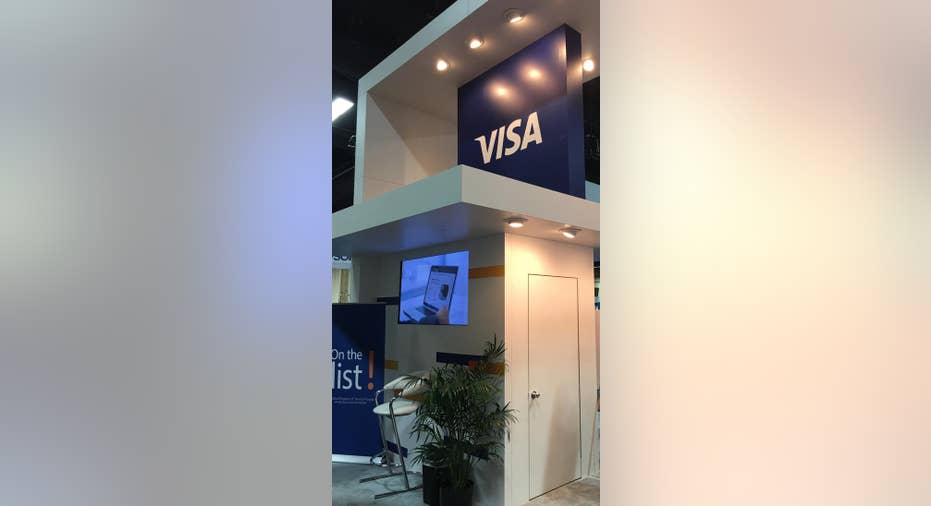Has Visa Solved the Biggest Problem Stopping EMV Adoption?

The chips embedded in newer credit cards make shopping safer, but they also slow down the process of buying things.
Instead of simply swiping your card, you have to leave it in the reader, which slows down the transaction. That's frustrating for consumers, but it's downright disastrous for merchants during busy times, when the added processing time leads to longer lines and dissatisfied customers.
That explains why the rollout of EMV cards -- that's short for Europay, MasterCard , and Visa -- has been moving slowly in the United States. The process began in October, at which time stores that processed EMV cards using the old magnetic stripe would take over fraud liability from MasterCard, Visa, and other providers.
In theory, that shift should have forced retailers to make the change, but only about 20% of merchants in the U.S. have adopted chip-enabled terminals, according to Visa. Larger retailers have specifically cited disrupting the checkout process as a reason to delay EMV adoption, Bankrate reported.
That's a legitimate fear, because anyone who has used an EMV-equipped Visa or MasterCard has experienced the slow process firsthand. But the days of having chip-enabled cards take longer to process may be over, now that Visa has introduced Quick Chip for EMV, a way to speed up the process and make it as fast as the traditional swipe.
What is Visa doing?The company showed off its new Quick Chip technology at the Electronic Transaction Association's Transact 16, an annual trade show and conference for all the players in the payments space. Offered free of charge "to payment processors, acquiring banks, and other payment networks to offer to merchants," according to a press release, "the upgrade streamlines the processing of chip card transactions."
Visa showed off its new software at its Transact 16 booth. Image source: author.
According to the Visa, the new technology lets shoppers "dip and remove their EMV chip card from the terminal, typically in two seconds or less, without waiting for the transaction to be finalized."
Adding Quick Chip doesn't require any new devices. It's a software upgrade to the retailer's credit card terminal or point-of-sale system.
"Visa is advancing a streamlined approach to chip transactions to make them faster and more efficient, while still providing a safe and secure experience," said Mark Nelsen, the company's senior vice president of risk products and business intelligence. "Quick Chip for EMV helps make the checkout experience comparable to the ease and speed of magnetic-stripe transactions."
This is a game-changer Visa hasnot only solved a major paint point in pushing EMV adoption, but it has also done so in a way that doesn't require retailers to buy anything. Quick Chip is not specific to Visa, either. It will work with MasterCard or other credit cards supported by the stores adopting the technology.
No merchants or consumers are against added security, but both have had problems with the generally clunky process of using chip-equipped cards. No store wants a slower process, and no consumer wants to have to leave his or her card in the reader, which comes with a possibility of leaving it behind. Quick Chip eliminates those problems and really the only major objection to EMV.
Ultimately, this will benefit not just Visa, but also MasterCard, because it will hasten the process of getting retailers to adopt this more secure technology. This is a case where one company has done something that will benefit everyone in the industry. That's ultimately going to pay off for the credit card companies in an increased volume of transactions, higher consumer confidence, and less fraud.
The article Has Visa Solved the Biggest Problem Stopping EMV Adoption? originally appeared on Fool.com.
Daniel Kline has no position in any stocks mentioned. He has two cards with chips and is annoyed at the slow processing times. The Motley Fool owns shares of and recommends MasterCard and Visa. Try any of our Foolish newsletter services free for 30 days. We Fools may not all hold the same opinions, but we all believe that considering a diverse range of insights makes us better investors. The Motley Fool has a disclosure policy.
Copyright 1995 - 2016 The Motley Fool, LLC. All rights reserved. The Motley Fool has a disclosure policy.



















